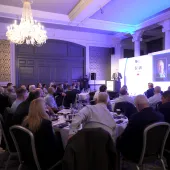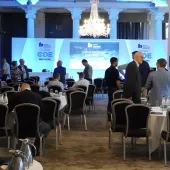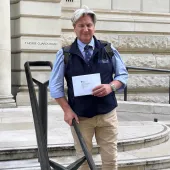BAA Annual Conference 2017 Review

First published in the July 2017 issue of Quarry Management
QM reports on the British Aggregates Association’s 2017 seminar proceedings
Businesses should wear their successes on their sleeves for everyone to see. That was the message from business champion Lord Digby Jones when he spoke to members of the British Aggregates Association (BAA) at their annual conference.
The mood music, as he described it, needs to change so that society understands the role of business in wealth creation.
Society’s demonization of business even extends to soap operas, where the bad guy is always a businessman, said the cross-bench peer, a former director general of the Confederation of British Industry (CBI) and one-time Minister for Trade & Investment.
Lord Jones spoke for more than an hour, in equal measure amusing and inspirational, leaving the BAA delegates at the Forest of Arden Hotel in Warwickshire on 19 June upbeat and enthusiastic.
And he spoke with some knowledge of the industry, because, as a lawyer, he was involved when Bardon merged with Camas to create Aggregate Industries and later when it eventually merged into Holcim.
‘It is in one way, such a misunderstood sector. And in another way, so vital to the enhanced productivity of our country. So I applaud you,’ he said.
Productivity was a recurring theme of his presentation. It is, after all, the key to increasing wealth. He said France had the world’s highest productivity per hour worked because it was so difficult to dismiss people there. As companies could not get rid of employees, they worked hard to motivate and educate those it had. On the other hand, companies were reluctant to expand their workforces because of the difficulty of shrinking it again, so unemployment was high.
In the UK it was the other way round. Lord Jones blamed a lack of training and motivation for low productivity in the UK, although he said the flexible labour regime led to higher employment.
Smaller companies were particularly bad at training people and presenting career paths for employees to grow through. Lord Jones had heard owners say they did not want to train people just to have them leave and go and work for someone else. His response to that: ‘It’s so much better to train someone and they leave than you don’t train them and they stay.’
He said if the UK was going to make the most of Brexit and pay for the pet projects of politicians, productivity had to improve. He proposed a ‘flexible median’ between the French way and the British approach. He cited Jaguar Land Rover, Rolls Royce and Toyota as examples of companies that train and motivate their employees, which Lord Jones attributed to them achieving world-leading productivity levels in their UK factories.
‘You have just heard from Julie,’ he said, referring to the presentation by Julie Stone of the University of Derby that preceded his talk. She and her colleague Mark Osbaldeston had told the conference about the specialist training opportunities offered by the university for minerals producers, from short, online courses to a Level 7 MBA available through the university’s minerals department and specifically geared to the industry. ‘I learnt from that,’ said Lord Jones. ‘Everything you said I thought was marvellous.’
He thought the education system was letting down industry and contributing to the lack of productivity. Half the children taking their GCSEs as the minerals companies were meeting in Warwickshire would not achieve grade ‘C’ or better in English and maths. Lord Jones said they were not fit for the world of work, which was ‘an absolute obscenity’.
The typical illiterate adult in the UK is white, male and 26-years-old, he said. A third of all adults could not add up three numbers in their head. ‘And we want to beat China, do we?’
With the conference so soon after the general election, Lord Jones took the opportunity to criticize politicians of all parties. He said he is staunchly non-partisan about politics. When Gordon Brown made him Minister for Trade & Investment in 2007 he had refused to join the Labour Party, becoming the first serving Minister not to be a member of the ruling party. It would have been the same if the Conservatives had asked him to work with them, he said. ‘I’m pasionately independent of the tribalism of politics.’
He complained that Labour under Jeremy Corbyn was anti-wealth and anti the motive of profit, and that the Conservatives under Theresa May, instead of producing the work of fiction that he said was their general election manifesto, should have committed to a wide-ranging, cross-party debate involving interests outside politics to find a solution to the problem of an aging population.
‘There are a lot of worried people around and we have to work with them. We have to help all of society as we go about making money,’ he said. He paraphrased Andrew Carnegie: There’s nothing wrong with making money; it’s what you do with it that matters.
Businesses create wealth and once they have earnt money there are only three things they can do with it: distribute it to shareholders; invest it; pay people for their labour. In each case it will be taxed. ‘If it wasn’t for the profit you make there wouldn’t be a single job in Britain.’ He added: ‘I don’t think the country gets it, by and large.’
Lord Jones recognized the conflicts between business interests and the rest of society. He lives in the countryside and doesn’t want it spoiled. But he felt there had to be compromises that could leave all interests satisfied.
He complained about UK planning regulations, which he called ‘one of the most unproductive, obstructive and disgraceful’ regimes in Europe, while accepting that controls were needed or the whole country would be covered in concrete or, in the case of quarrying, dug up.
Other speakers at the conference would have concurred. They included representatives of the Environment Agency, the Woodlands Trust, the Wildlife Trust and Nature After Minerals, although they were all at pains to praise the minerals industry for its contributions, especially through restoration projects.
Lord Jones complained about some business practices, especially poor payment practices such as the unilateral extension of payment periods and the withholding of payment, so common in the construction industry, with smaller firms held over a barrel by larger firms. ‘What they’re asking you to do is to become their bankers.’ His solution: make it illegal and make individuals personally liable. ‘It would stop overnight.’
He felt what the world needs and is lacking is leadership. ‘Leaders inspire, taking people to places they never even thought they could go. It’s about them going home at night thinking: yes, I get it. It’s about getting them wanting to go to work in the morning because they feel ready for the challenge. They feel yes, they can because you will be there for them. Pull it off and I don’t think this nation has a thing to worry about. We’re in the right place, doing the right thing in Asia’s century; a globalized economy. Fail and our grandchildren will never forgive us.’
If you want to read more about Lord Digby Jones’ views on what businesses should be doing, you can do so in his second book, ‘Fixing Business’, which delegates were given at the BAA conference. Lord Jones is giving the royalties from sales to charity, as he did with his first book, ‘Fixing Britain’.
The rest of the event followed the familiar format with 15-minute cameo presentations in the morning by eight speakers and four longer presentations after lunch, further details of which will appear in next month’s edition of QM.
The morning presentations were by Kevin Mahoney of Green Biofuels; Jim Davies from the Environment Agency; Victoria Banks Price from the Woodlands Trust; Mark Oldridge from Mineral Surveying Services; John Wilkinson from the Mineral Products Qualifications Council; Cath Pickett from the Health &and Safety Executive; and Mike Phillips from the Institute of Quarrying, which is celebrating its centenary.
In the afternoon, Rupert Craven from plant and machinery auctioneers Ritchie Bros discussed market trends in quarry equipment; Peter Dorans from the Wildlife Trust explored how quarries and their restoration is helping wildlife; Helen Barnard from Nature After Minerals spoke about the work of NAM, which is now celebrating its tenth anniversary; and Mark Osbaldeston and Julie Stone from the University of Derby outlined the courses the university offers that are of particular interest to smaller quarry operators, including its high-quality online courses.
After the conference came the BAA’s annual general meeting, followed by the annual dinner. And on 20 June, the day after the conference and AGM, there was the annual golf tournament to round it all off.
- Subscribe to Quarry Management, the monthly journal for the mineral products industry, to read articles before they appear on Agg-Net.com








